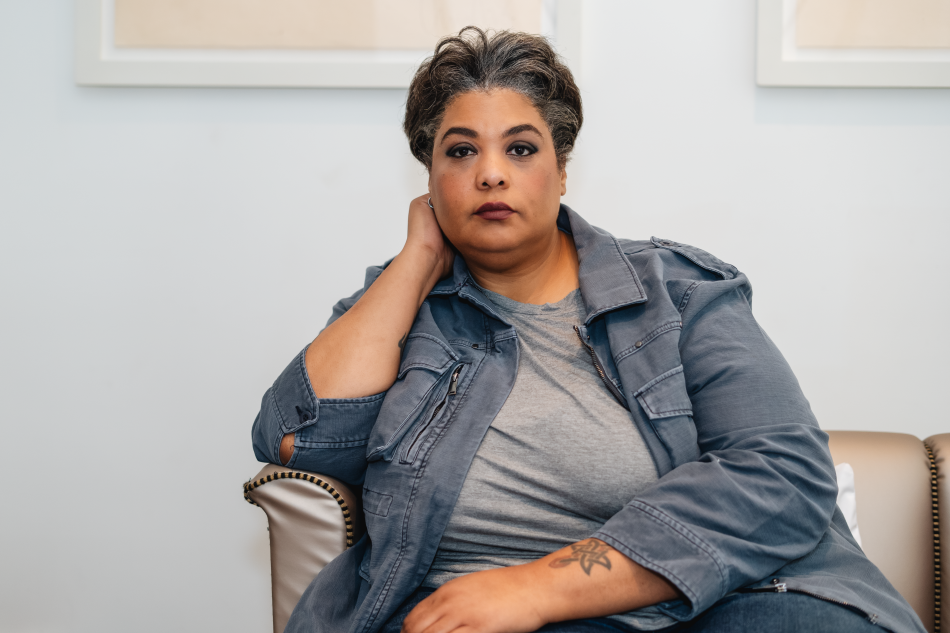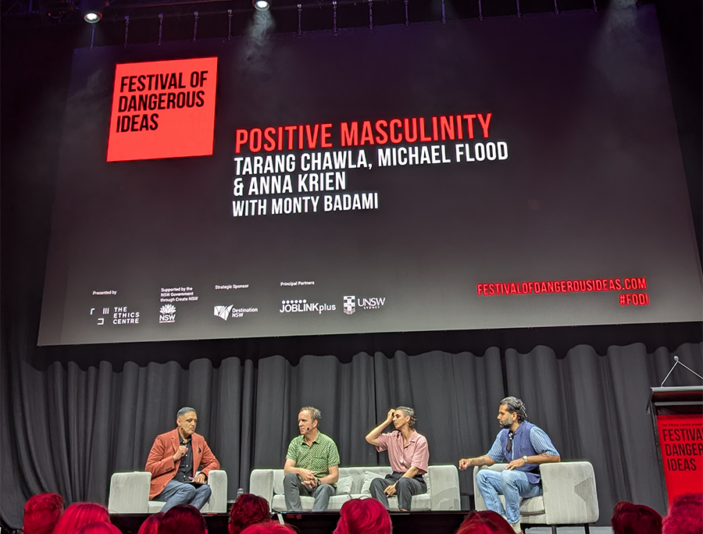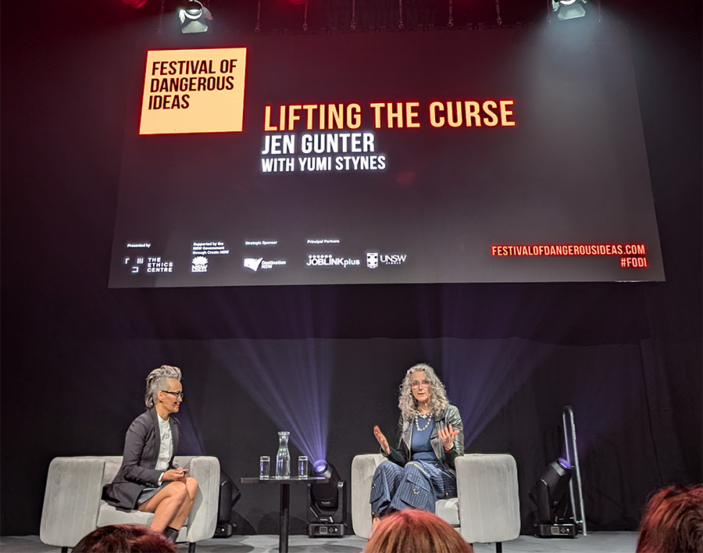
Launching in 2009, the Festival of Dangerous Ideas (FODI) brings together thought leaders, culture creators and radical creatives from across Australia and around the world. Presented by The Ethics Centre, FODI creates a space for exchanging ideas and discussing topics often considered outside the everyday. It aims to cultivate critical thinking and a growth mindset around some of the biggest issues facing our world today.
Held at Carriageworks, this year’s curated festival tackled topics ranging from race to anti-natalism. Below are the four talks I attended across the weekend.
How to have dangerous ideas: Roxane Gay
Chaired by Narelda Jacobs
Author and culture critic Roxane Gay is no stranger to criticism on the internet. Misogyny, homophobia, death threats – how is it possible to continue to speak out when it feels as if the whole world wants to silence you?
Gay laments that being stubborn helps, commenting, “I’m afraid, but I just write what I want to write anyway.” With the eruption of cancel culture, it seems as if we are existing, as the author puts it, in an “age of inelasticity”, where nuanced conversations appear to be a thing of the past, where “Everyone is talking, very few people are listening.”
It was interesting to hear Gay discuss that there are dangerous ideas, and endangering ideas. There is a clear and distinct difference. Issues around the use of mental illness as a weapon were discussed, and it brought to mind the Bondi Junction stabbings from earlier this year in which 5 women and 1 man were killed. News reports at the time largely attributed this targeted attack on women to the perpetrator’s mental health. But as Gay pointed out, mental illness doesn’t make you racist and it doesn’t turn you into a murderer. We need to stop allowing people (usually men) to use this as a shield.
Perhaps the most important comment from Gay for anyone considering airing their opinions online, usually behind a nameless, faceless façade: “Just because people have feedback doesn’t mean I have to receive it.”

Positive Masculinity: Tarang Chawla, Micheal Flood, Anna Krien
Chaired by Monty Badami
It is no secret that we are amid a global crisis when it comes to men’s violence against women. It is women who have led the struggle, but what can men bring to the fight?
Writer and advocate Tarang Chawla says there is a lack of positive roles models in Australia and that we need better from our leaders in politics, business and especially sport. We still profile and elevate sports people, often seen as role models for young boys, even after being accused or convicted of a crime. He suggested we make these men talk to their crimes and talk to their shame. To take accountability for their actions instead of hiding behind their ability to kick a ball.
Author Anna Krien discussed what she calls the “incarceration epidemic” and how the treatment of men in prison is not helping the problem. On average 1 in 3 perpetrators of violence were on bail or parole when they killed their partners. We don’t condone rape in society, but it is somehow accepted within the prison system. It is as if there is a certain amount of violence we accept against men, both in and outside of prison. After all, historically men have been expected to fight wars. Krien states, “If you don’t seek to understand violence, you’re condoning it.”
The mental health of men and boys was discussed by the panel, with Krien commenting that we need to look at intergenerational trauma and poverty if we want to combat men’s violence. Professor Michael Flood who is a researcher on men, masculinities, and gender, violence against women, and violence prevention, also commented that we have to include men and boys in the conversation but not just addressing their pain. We also need to take into account their privilege and power.
Despite the obvious issues surrounding men’s mental health, Chawla adds that these issues can never be used to downplay or minimise patriarchal norms and men’s violence.
When it comes to masculinity itself, Flood comments that “toxic masculinity is limiting for boys and men themselves.” It is just one type of masculinity, not a critique of men as a whole. He suggests we “need to encourage men to de-invest in masculinity” so that they no longer care about it. We also “need to raise the bar on what makes a good man,” because, according to Flood, currently the bar is unbelievably low.
So what is the solution? Krien believes part of it lies in educating boys on the history of women’s oppression. For example, women were not elected to the Commonwealth Parliament until 1943 and it wasn’t until 1965 that Australian women won the right to drink in a public bar.
Perhaps most importantly, Chawla asked the question, “If a woman is being murdered every 4 days in Australia, how progressive a society are we?”
Not progressive enough.

Lifting the curse: Jen Gunter
Chaired by Yumi Stynes
In the 1970s a medical journal published information claiming that a menstruating woman could wilt flowers. It sounds like a joke. It’s not. Author, obstetrician, and gynecologist, Jen Gunter spoke about the myths that surround women’s health and how the spread of misinformation is harmful and prolific.
Vocally anti pseudoscience, which preys on people’s fear and lack of understanding, Gunter discussed the role the media play in the promotion of disinformation and how it is these headlines that get attention – not facts. She explained that repetition breeds accuracy, and where do we see this demonstrated the most – social media.
It wasn’t until 1992 in America that medical study groups had to have an equal number of women to men (depending on the treatment being tested), and women’s health is still drastically underfunded and under researched.
An interesting point which Gunter made was that the term ‘pro-life’, as it relates to abortion, is incorrect. These people are forced-birthers. They do not care about the life of the pregnant person or the life of the child once it’s born.
According to Gunter there is nothing more dangerous to the patriarchy than empowering women with knowledge about their own bodies. So uterus owners, here’s some facts from Gunter herself:
- 40% of women under 22 are iron deficient.
- Balancing vaginal pH levels is not a real thing.
- A property contained within estrogen is carcinogenic.
- It’s a myth that birth control is a Class 1 carcinogenic.
- It is safe to take the pill everyday and skip your period altogether.
- Women are more likely to suffer from dementia and 45% of dementia is preventable.
Perhaps one of the most powerful things Gunter said was that “women deserve science.” They deserve detailed and accurate research. They deserve proper treatments instead of pseudoscience and supplements. It’s crazy to think that advocating for proper health care for women is a ‘dangerous’ idea, and not a basic human right.
The case for not having children: David Benatar
Chaired by Matt Beard
Leading proponent of anti-natalism, Philosopher David Benatar, discussed how we have a moral responsibility to not have children. That the decision whether to have children or not is an ethical one. He believes that, in creating a child, one imposes risk of serious harm. It’s wrong to impose such a risk without consent and consent can’t be obtained.
He clarified that he believes in preventing life, not removing life, and that having children dooms them to suffer because when “you bring a child into existence – there are no guarantees.”
Benatar discussed what he called the misanthropic argument that “we have a (presumptive) duty to stop bringing into existence new members of a species that cause pain, suffering and death.” That species being humans. That “the worst pains are worse than the best pleasures are good” – essentially, there is more bad than good in human existence.
I found this talk fascinating. I’ve never before heard anyone describe procreation as a “ponzi scheme.” Benatar commented that we never question pro-natalism, in fact celebrating people having children is expected in our society, but the opposite is scorned. I’m not saying I subscribe to these ideas, to be honest I found it all a bit too pessimistic for my taste, particularly when he said that even if we cure cancer, there will be something else that will kill you. But as someone who does not have children and has, in recent years, consider going it alone, this definitely validated some of my concerns and questions around whether conceiving and raising a child solo was in the best interests of the child.
Apparently anti-natalism is different to childfree by choice. If someone decides not to have children, it is usually an easy decision because they do not want children. Someone who is anti-natalist may actually want children but have decided that it would be in the best interests of the child not to be born.
What does it say about the world we live in that it is now morally questionable to bring children into the world?
The Festival of Dangerous Ideas was held 24 – 25 August 2024 at Carriageworks.
Recordings of the talks can be accessed via the FODI website.
